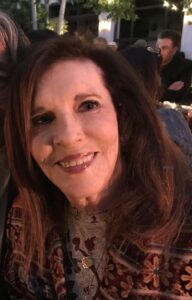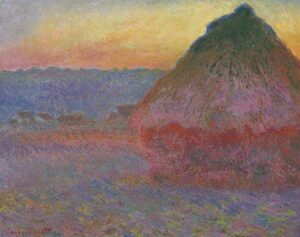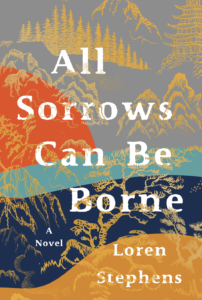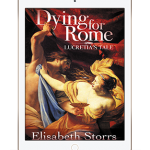 My last guest for 2022 is Loren Stephens. As you will read, Loren is an immensely talented lady. She is a widely published essayist and fiction and nonfiction storyteller. Her work has appeared in the Los Angeles Times, the Chicago Tribune, MacGuffin, the Jewish Women’s Literary Annual, The Forge Literary Magazine, Crack the Spine, Lunch Ticket’s Amuse Bouche series, The Write Launch, The Summerset Review, The Montreal Review, and Tablet travel magazine, to name a few. The book she co-wrote with Cliff Simon, Paris Nights: My Year at the Moulin Rouge, was deemed one of the best titles from an independent press by Kirkus Book Reviews. A two-time nominee of the Pushcart Prize, Loren is president and founder of the ghostwriting companies, Write Wisdom and Bright Star Memoirs. Prior to establishing her company, Loren was a documentary filmmaker. Among her credits are Legacy of the Hollywood Blacklist with on camera narration by Burt Lancaster, produced for PBS and nominated for an Emmy Award; Sojourner Truth: Ain’t I A Woman? produced for Coronet Films and recipient of a Golden Apple from the National Education Association; and Los Pastores: The Shepherd’s Play produced for the Latino Consortium of PBS and recipient of a Cine Gold Eagle and nominated for an Imagen Award. She is a member of the National Commission of the Anti-Defamation League; a member of its Deborah Awards Committee for Outstanding Women; and a member of Greenlight Women, an organization of women in the entertainment industry who serve as mentors.
My last guest for 2022 is Loren Stephens. As you will read, Loren is an immensely talented lady. She is a widely published essayist and fiction and nonfiction storyteller. Her work has appeared in the Los Angeles Times, the Chicago Tribune, MacGuffin, the Jewish Women’s Literary Annual, The Forge Literary Magazine, Crack the Spine, Lunch Ticket’s Amuse Bouche series, The Write Launch, The Summerset Review, The Montreal Review, and Tablet travel magazine, to name a few. The book she co-wrote with Cliff Simon, Paris Nights: My Year at the Moulin Rouge, was deemed one of the best titles from an independent press by Kirkus Book Reviews. A two-time nominee of the Pushcart Prize, Loren is president and founder of the ghostwriting companies, Write Wisdom and Bright Star Memoirs. Prior to establishing her company, Loren was a documentary filmmaker. Among her credits are Legacy of the Hollywood Blacklist with on camera narration by Burt Lancaster, produced for PBS and nominated for an Emmy Award; Sojourner Truth: Ain’t I A Woman? produced for Coronet Films and recipient of a Golden Apple from the National Education Association; and Los Pastores: The Shepherd’s Play produced for the Latino Consortium of PBS and recipient of a Cine Gold Eagle and nominated for an Imagen Award. She is a member of the National Commission of the Anti-Defamation League; a member of its Deborah Awards Committee for Outstanding Women; and a member of Greenlight Women, an organization of women in the entertainment industry who serve as mentors.
Loren has now ventured into writing historical fiction with All Sorrows Can Be Borne. Inspired by true events, the novel is the story of a Japanese woman forced to give up her son to save her husband. Set in Hiroshima, Osaka, and the badlands of eastern Montana, the novel spans the start of World War II to 1982.
You can connect with Loren Stephens via her website, Twitter @LorenStephensWW and Instagram @LorenStephensAuthor.
You can purchase All Sorrows Can be Borne at Barnes & Noble and Amazon.
What or who inspired you to first write? Which authors have influenced you?
I have always been an avid reader since I was a young girl: Sara Crew; The Secret Garden, the Oz books; Nancy Drew mysteries. Authors that have influenced me: too many to mention but currently Claire Massud; Barbara Kingsolver; Stephen King.
What is the inspiration for your current book? Is there a particular theme you wished to explore?
My novel, All Sorrows Can Be Borne, is based on my husband’s family history in Japan. I wrote this book to better understand why my husband’s Japanese birth parents gave him up for adoption to his aunt and uncle in Glendive, Montana, not knowing if they would ever see their son again. Their sacrifice ‘to give him a better life’ led to unimaginable tragedy. I spent years conducting background research about the bombing of Hiroshima, the events of World War II and the rebuilding of Japan as well as the immigration policies between the US and Japan, which set up roadblocks to my husband’s parents’ intention.
What period of history particularly inspires or interests you? Why?
I am particularly fascinated with World War II and its aftermath in the United States. How the war affected politics, the role of women in our society; the outbreak of feminism. I am interested because this is the period of my parents’ generation.
What resources do you use to research your book? How long did it take to finish the novel?
I conducted a lot of in person interviews here in the United States and in Japan. I read extensively history books as well as novels set in the period of World War II, especially what was happening in Japan. I was very interested in books about diplomacy between the US and Japan and how President Kennedy worked to improve relations between the two countries after the war. It took me ten years to write and publish the novel.
Together with my husband’s adoptive mother, I went to Japan to meet with his birth mother, still living in Osaka, and we spent many days discussing my book. Since there were several people who were no longer alive including my husband’s birth father and some of the events were difficult to remember, I took a leap of faith and turned the book into a novel so that I could imagine what might have happened. I had to rely on instinct and creativity to craft a novel that is inspired by a true story, but reflects the freedom of a writer.
What do you do if stuck for a word or a phrase?
I sit quietly and wait for a word to pop into my head. As a last resort, I use the internet to look up synonyms that are similar to a less inspiring word.
Is there anything unusual or even quirky that you would like to share about your writing?
I write many genres and I am also a ghostwriter. I have written over forty books for my clients through my company, Write Wisdom. I switch between writing under my own name and writing under the name of my author/clients.
Do you use a program like Scrivener to create your novel? Do you ever write in long hand?
I sometimes write in long hand when I am editing a hard copy of my manuscript; but when I am composing I write exclusively on the computer.
 Is there a particular photo or piece of art that strikes a chord with you? Why?
Is there a particular photo or piece of art that strikes a chord with you? Why?
I love the Impressionist painters. Standing in front of a Monet is heavenly. Seeing how he creates a work of art that at first may look “foggy” but as you stand there objects become clearer. The same may be true for the writing process. I also love Klimt. His decorative style is gorgeous.
What advice would you give an aspiring author?
Write about what makes you curious. Writing is a long haul. You want to uncover a world of surprises.
Tell us about your next book.
I am starting to work on a semi-autobiographical novel – a romance that goes haywire. The working title is Elise Goldberg Goes to Paris but that will probably change over time, or maybe not.

Inspired by true events, All Sorrows Can Be Borne is the story of Noriko Ito, a Japanese woman faced with unimaginable circumstances that force her to give up her son to save her husband. Set in Hiroshima, Osaka, and the badlands of eastern Montana and spanning the start of World War II to 1982, this breathtaking novel is told primarily in the voice of Noriko, a feisty aspiring actress who fails her audition to enter the Takarazuka Theater Academy. Instead, she takes the “part” of a waitress at a European-style tearoom in Osaka where she meets the mysterious and handsome manager, Ichiro Uchida. They fall in love over music and marry. Soon after Noriko becomes pregnant during their seaside honeymoon, Ichiro is diagnosed with tuberculosis destroying their dreams.
Noriko gives birth to a healthy baby boy, but to give the child a better life, Ichiro convinces her to give the toddler to his older sister and her Japanese-American husband, who live in Montana. Noriko holds on to the belief that this inconceivable sacrifice will lead to her husband’s recovery. What happens next is unexpected and shocking and will affect Noriko for the rest of her life. Eighteen years later, her son enlists in the U.S. Navy and is sent to Japan. Finally, he is set to meet his birth mother, but their reunion cracks open the pain and suffering Noriko has endured.
With depth and tenderness, All Sorrows Can Be Borne is a harrowing and beautifully written novel that explores how families are shaped by political and economic circumstances, tremendous loss and ultimately forgiveness.
You can purchase All Sorrows Can be Borne at Barnes & Noble and Amazon.
Thanks so much for giving us a glimpse into your inspiration for your novel. There are few books exploring the Japanese-American experience so I’m sure readers would love to learn more.
 Haven’t subscribed yet to enter into giveaways from my guests? You’re not too late for the chance to win this month’s book if you subscribe to my Inspiration newsletter for giveaways and insights into history – both trivia and the serious stuff! In appreciation for subscribing, I’m offering an 80 page free short story Dying for Rome -Lucretia’s Tale.
Haven’t subscribed yet to enter into giveaways from my guests? You’re not too late for the chance to win this month’s book if you subscribe to my Inspiration newsletter for giveaways and insights into history – both trivia and the serious stuff! In appreciation for subscribing, I’m offering an 80 page free short story Dying for Rome -Lucretia’s Tale.



A fascinating cultural interface! It is amazing that it has not been explored more often. The shadows of WWII and Hiroshima still stretch long and dark into our psyches.
I am an avid reader and am enthralled with stores based on truth and set in other countries. The true test of a book, for me, is to never want to stop reading and learning about other cultures, locations, legal systems, laws and generally learning about a person’s attitude in dealing with issues.
It’s great to see a book exploring the history behind Hiroshima and the Japanese American experience in WW2.
Hello readers. When I wrote All Sorrows I was particularly interested in conversations with Japanese people who had lived through the war to gain their perspective and understand how they saw the conflict, and how quickly they adjusted to the notion after the war that the Americans were going to help rebuild their country and bring rights to the people — particularly women who had not been allowed to vote before the war. Glad if I succeeded somewhat in shedding light on this aspect of the conflict and its aftermath.
I loved the book!